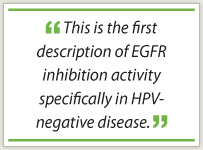Discussing the presentation, Jean Bourhis, MD, PhD, of the Institut Gustave Roussy in Villejuif, France, said that while HPV has become a major prognostic factor in locally advanced head and neck cancer, its prognostic value in recurrent and metastatic disease is less clear.
 “The role of HPV in recurrent and metastatic disease for predicting response to EGFR monoclonal antibodies is also unknown,” he said.
“The role of HPV in recurrent and metastatic disease for predicting response to EGFR monoclonal antibodies is also unknown,” he said.
According to Dr. Bourhis, SPECTRUM has several limitations. It is a subgroup and retrospective analysis, only two-thirds of the patients had HPV status evaluable, the analysis of HPV was primarily done on the primary (not the recurrent) tumor, and the test for interaction was nonsignificant.
Nevertheless, this is the first description of EGFR inhibition activity specifically in HPV-negative disease, and the data are consistent with previous findings, he said.
“There is a potentially important clinical impact of these findings,” he concluded. “But because of some limitations in the study, there is a need for confirmation and for generating additional level 1 evidence in recurrent/metastatic disease.” ■
Disclosure: Dr. Bourhis reported no potential conflicts of interest.

 The...
The...